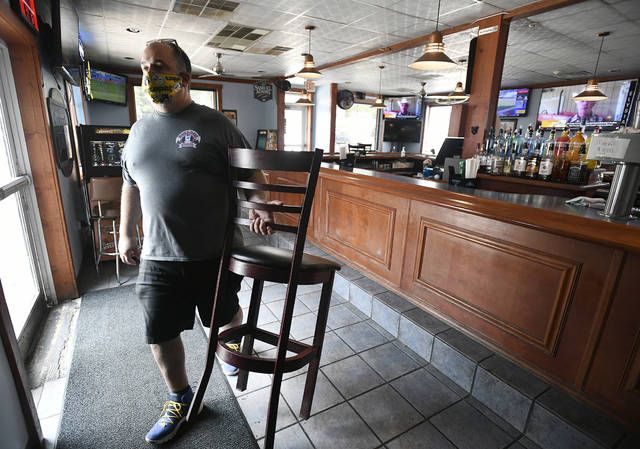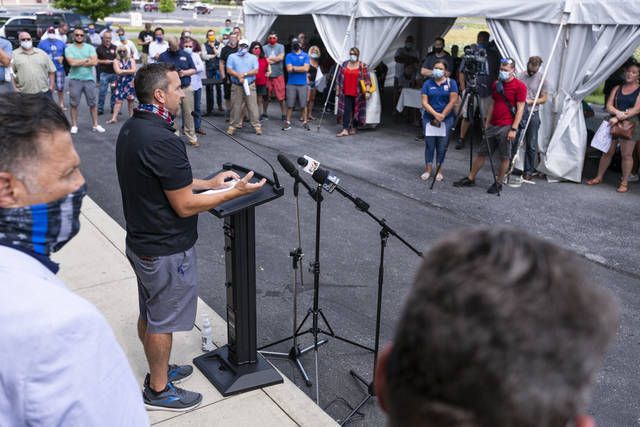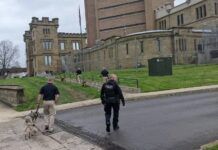
BigDogz Grill owner Michael Ziants removes the last chair from his bar in Johnstown to comply with Governor’s Wolf new COVID-19 restrictions for bars on Thursday.
Todd Berkey | The Tribune-Democrat via AP
Also: Sports teams want fans in stands
HARRISBURG — As Pennsylvania approached 100,000 confirmed cases of the coronavirus on Friday, restaurant and bar owners say they will fight back against Gov. Tom Wolf’s orders to further limit the number of patrons they’re allowed to serve at a time.
Wolf’s order this week to reduce occupancy at bars and restaurants from 50% to 25% will drive them out of business or into debt, restaurant owners said Friday, asserting his administration lacks the data to target them as the reason behind the spike in coronavirus cases in some parts of the state.
At a news conference outside a suburban Harrisburg restaurant, restaurant owners said they are laying off staff and taking yet another hit, with barely any notice before the governor announced new restrictions Wednesday.
“Here we are going into a weekend and he just drops the hammer on us,” said Matt Flinchbaugh, owner of Flinchy’s Restaurant & Bar, just a few miles from the state Capitol.
With various legal challenges to Wolf’s disaster emergency authority having failed, industry officials and state Republican lawmakers acknowledged they’ll have to prevail in the court of public opinion and get Democratic lawmakers to join Republicans in challenging Wolf through legislation.
John Longstreet, president and CEO of the Pennsylvania Restaurant & Lodging Association, said there is no public health difference between 50% capacity — the order to restaurants before Thursday — and the new 25% capacity order in preventing the spread of the virus.
“There will be no statistics to show that 25% makes sense because they don’t exist,” Longstreet said. “The only the only thing that exists is that face-masking and social distancing works.”
Flinchbaugh acknowledged that “bad eggs” are out there, but questioned why the government couldn’t target and shut them down instead of taking a blanket approach that will punish the industry, its vendors and workers.
Flinchbaugh and others also said the Department of Health lacks statistics to show that bars and restaurants are behind the spike in cases.
The Health Department said there is “strong evidence” to support the state’s clampdown on bars and restaurants. The agency cited contract tracing data from Allegheny County — the current epicenter of the pandemic in Pennsylvania — that showed that many exposures took place at bars and restaurants where alcohol was served, and where masking and social distancing guidelines weren’t being followed.
“The department also conducted analyses and case investigations in counties outside of Allegheny that demonstrate bars and restaurants as a nexus for the spread of COVID-19,” said Health Department spokesperson Nate Wardle.
Restaurant owners also contend that coronavirus restrictions and practices at restaurants and bars were already tighter than they are at big box stores, casinos and other businesses.
Melissa Bova of the Pennsylvania Restaurant & Lodging Association said the organization is pushing a legislative agenda that includes grants of up to $50,000 for restaurant owners, liability protection and relief from regulatory fees.
Citing the ongoing outbreak in southwestern Pennsylvania and disease modeling that shows rising infections elsewhere, Wolf’s administration reimposed some statewide pandemic restrictions this week, shutting down nightclubs, closing bars unless they also offer dine-in meals and reducing occupancy at bars and restaurants.
Both Pennsylvania and Allegheny County reported big increases in cases on Friday. Pennsylvania reported more than 1,000 new coronavirus cases Friday, bringing the statewide total to more than 99,400, 19 new deaths for a statewide toll of almost 7,000.
Allegheny County reported 240 more people testing positive between June 29 and July 16. Despite the spike, county health authorities relaxed restrictions on indoor dining Friday to bring them in line with the state’s.
The Allegheny County Health Department had prohibited indoor dining and alcohol consumption at bars and restaurants in response to a sharp rise in coronavirus cases. The health director, Dr. Debra Bogen, revised her order Friday to allow indoor table service, but said patrons must leave indoor and outdoor seating areas by 11 p.m.
In other coronavirus-related developments in Pennsylvania on Friday:
Fans in the stands
Several professional, semi-professional, amateur and college sports teams have submitted plans to the state Department of Health to have fans in the stands, the agency said Friday.
The Wolf administration declined to reveal which organizations, teams or colleges have submitted plans, or whether it has approved any, saying it’s up to the teams to reveal that information.
But the administration said it continues to discourage spectators or fans from attending games to prevent transmission of the virus.
Professional and college sports remain subject to Pennsylvania’s state-ordered limit of fewer than 250 people on site for games and practices, effectively meaning that Philadelphia Eagles, Pittsburgh Steelers and Penn State football games cannot have fans in the stands.
However, the Health Department said “a number” of teams had submitted plans to the agency under a provision of its health orders that allow them get approval to exceed that limit.
Penn State Athletics said it is working with various governing bodies on scenarios “for a possible return this fall consistent with physical distancing, mask wearing and other preventative safety steps.”
“While we are optimistic, it is too early to project, and any potential scenario would need to meet local and state public health guidance based on developing conditions for the virus in our community and elsewhere,” it said.
A Pittsburgh Steelers spokesperson said only that the team is in touch with the governor’s office. The Philadelphia Eagles declined to comment.
More college sports postponed
The Atlantic 10 Conference is postponing its fall sports season, which includes soccer, cross country, field hockey and women’s volleyball.
The conference announced Friday it will try to play those sports in the spring semester, and has agreed to a “look-in” window during September to evaluate whether it is possible to conduct shortened, conference-only seasons in fall sports.
Pennsylvania schools in the conference are Duquesne University, La Salle University and Saint Joseph’s University.
Pennsylvania society dinner off
Pennsylvania’s business and political elite and won’t be traveling en masse to New York for their annual gathering.
The Pennsylvania Society canceled its annual dinner, scheduled for Dec. 5, because of the coronavirus. It also will not name a Gold Medal winner in 2020.
Instead, the group “will focus its efforts this year on saluting the extraordinary efforts of Pennsylvania’s frontline workers from across the Commonwealth who have worked tirelessly in difficult conditions to keep their fellow Pennsylvanians safe,” its president, Edward Sheehan Jr., said in a written statement.




